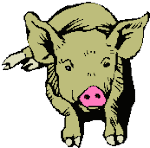A very important article from the Ingineer this morning summarising the current MRSA situation in Denmark, with a look at Norway's efforts to eradicate the problem and a comment on the important British market.
The mechanical translation is a bit rough, the picture painted really accurate and depressing, but they miss the point in their very last sentence: that there is an immensely profitable premium market waiting development. The Norwegians are lining up to take it, with my parallel ideas for the Scottish island of Islay, following the same potential course, albeit slowly. Even Denmark is trying to start something similar on Bornholm.
It is good to be constructive in bad times.
The "saber rattling" from the UK is a fabrication to help cover-up a massive scandal founded on veterinary drug dealing. The scandal will unravel taking much of the current British veterinary establishment with it.
There is no reason to think that British pigs are any healthier than Danish pigs. The cogenesi all know that: their marketing stance betrays them. They are keen on marketing, more keen than is healthy, and they certainly would not miss the opportunity.
If British pigs really were free of MRSA, Defra, Britain's corrupt agricultural ministry and their cronies would be yelling it from the rooftops, increasing production and, demanding and getting premium prices for MRSA free pork. That is simple common sense. They would not miss the chance.
But "good money" can drive out bad, premium prices can create the expensive production that shows that MRSA free pigs are possible.
Then it is just politics, economics and tending the graves of the victims of the scandal of the century.
Be sure to read the Ingineer article in full, here. It is interesting, reliable and important.
MRSA: therefore being so little, even if you hear so much
Analysis: An Action Plan will not seriously dampen the occurrence of resistant bacteria pig - but there is no inexpensive ways to get rid of it.
By Magnus Bredsdorff March 29, 2015 at. 12:00
How can a bacteria like MRSA that gets so much attention in the public debate, still allowed to spread between pigs and humans?
The question remains, after the Food Minister Dan Jørgensen (S) last week presented an action plan to curb the infection. For the problem with the plan is that it does not do much to actually reduce infection.
It sounds totally illogical, and for an explanation, we need to turn the clock back one year. When initiated engineer as first a long series of articles, which documented that the infection was more or less out of control...
...It will, however, according to the researchers not the action plan, which reduces MRSA infection significantly.
In the short term it can only happen if agriculture itself sees an interest in it. It could, for instance. be if overseas customers start demanding MRSA-free pork. Supermarket chains in both the UK and Sweden have rattled the saber, but so far it has been empty threats. For it will be impossible to obtain MRSA-free meat in large quantities from anywhere in the world.
